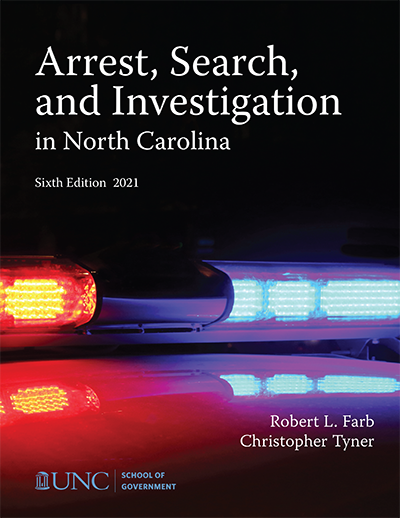Arrest, Search, and Investigation in North Carolina
Updates to this digital version by Jeffrey B. Welty. See individual chapters for update information.
Arrest, Search, and Investigation in North Carolina, available in both print and digital formats, covers the legal rules that govern an officer’s authority to enforce laws and to investigate criminal offenses. It also covers the basic rules of evidence in criminal cases. Supplementary material is placed in footnotes and includes discussions of appellate cases and statutory references to assist in researching particular issues. The text of the print version is current with case law through June 2021 and statutory law enacted by the North Carolina General Assembly through early July 2021. The content of the digital version is current through December 1, 2023.
The School of Government will continue to publish print editions of Arrest, Search, and Investigation every five years or so but is not planning to produce paper supplements to those volumes. Instead, faculty member Jeffrey B. Welty will be updating the digital version of the treatise until the next full edition is published. He has just completed the Spring 2024 Update, which is current through December 1, 2023, and will soon start working on the next update. The plan is to update the digital version twice each year—far more often than could be accomplished with printed supplements. To get the most up-to-date content, readers are encouraged to purchase the digital edition.
This book explains the legal rules that govern a North Carolina officer’s authority to enforce laws and investigate criminal offenses. It also provides an introduction to constitutional law and criminal law and procedure, and it explains the basic rules of evidence in criminal cases. In addition, it provides—in the footnotes to the text and in the case summaries sections—appellate cases and statutory references to assist in researching particular issues. However, new law enforcement officers need only read the text to understand the basic legal rules.
The text describes the prevailing law in North Carolina state courts and, if the law is unclear, what appears likely to be the prevailing law. The text relies primarily on North Carolina and federal statutory law and on cases of the United States Supreme Court, the North Carolina Supreme Court, and the North Carolina Court of Appeals, although other appellate court cases are sometimes cited and discussed. The text of the print edition is current with case law through June 2021 and statutory law enacted by the North Carolina General Assembly through early July 2021, although the 2021 session was still ongoing when the print version of this book was being prepared for publication. The Spring 2024 Update to the digital edition covers case and statutory law through December 1, 2023.
Legal treatises, law review articles, and other publications are sometimes cited, although the reader should be aware that they sometimes criticize appellate court rulings and thus disagree with prevailing law. Therefore, they do not necessarily state what is the law in North Carolina state courts. Still, they are valuable aids in understanding legal issues.
The footnotes in the text may refer to appellate cases that are not mentioned in the case summaries, and the case summaries may include cases not mentioned in the text or footnotes. Thus, the reader may want to check both sources for reference material on particular issues.
This is the sixth edition of a book originally published in 1986. The second edition was published in 1992, the third edition in 2003, the fourth edition in 2011, and the fifth edition in 2016. Relevant case summaries appear at the end of each chapter, although there are no case summaries for Chapters 1 and 6.
Thanks to the many School of Government colleagues who wrote many of the recent case summaries in this book or reviewed, edited, or prepared this book for publication.
We welcome comments about the structure or content of this book. We may be reached at farb@sog.unc.edu (or after December 2021, thefarbs@gmail.com) and ctyner@sog.unc.edu, respectively.
Robert L. Farb
Christopher Tyner
Chapel Hill
July 2021
This will be the last publication that I will write as a School of Government faculty member, as I expect to enter full retirement in April 2022 or shortly thereafter. I have greatly enjoyed serving North Carolina’s public officials and others during my forty-three years on the faculty.
I thank Christopher Tyner for his significant assistance in reviewing and suggesting modifications to the text, which definitely improved this book.
This book is dedicated to Bonnie, Debbie, Jessica, Kevin, Chris, Daphne, and Scarlett.
Robert L. Farb

